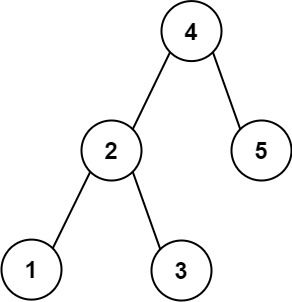Given the root of a binary search tree and a target value, return the value in the BST that is closest to the target.
Example 1:
Input: root = [4,2,5,1,3], target = 3.714286 Output: 4
Example 2:
Input: root = [1], target = 4.428571 Output: 1
Constraints:
- The number of nodes in the tree is in the range
[1, 104]. 0 <= Node.val <= 109-109 <= target <= 109
Binary search.
# Definition for a binary tree node.
# class TreeNode:
# def __init__(self, val=0, left=None, right=None):
# self.val = val
# self.left = left
# self.right = right
class Solution:
def closestValue(self, root: TreeNode, target: float) -> int:
res, min_diff = root.val, float('inf')
while root:
val = abs(root.val - target)
if min_diff > val:
min_diff = val
res = root.val
if root.val > target:
root = root.left
else:
root = root.right
return res/**
* Definition for a binary tree node.
* public class TreeNode {
* int val;
* TreeNode left;
* TreeNode right;
* TreeNode() {}
* TreeNode(int val) { this.val = val; }
* TreeNode(int val, TreeNode left, TreeNode right) {
* this.val = val;
* this.left = left;
* this.right = right;
* }
* }
*/
class Solution {
public int closestValue(TreeNode root, double target) {
int res = root.val;
double minDiff = Double.MAX_VALUE;
while (root != null) {
double val = Math.abs(root.val - target);
if (minDiff > val) {
minDiff = val;
res = root.val;
}
if (root.val > target) {
root = root.left;
} else {
root = root.right;
}
}
return res;
}
}/**
* Definition for a binary tree node.
* function TreeNode(val, left, right) {
* this.val = (val===undefined ? 0 : val)
* this.left = (left===undefined ? null : left)
* this.right = (right===undefined ? null : right)
* }
*/
/**
* @param {TreeNode} root
* @param {number} target
* @return {number}
*/
var closestValue = function(root, target) {
let res = root.val;
let minDiff = Math.abs(root.val - target);
while (root) {
const val = Math.abs(root.val - target);
if (minDiff > val) {
minDiff = val;
res = root.val;
}
if (root.val > target) {
root = root.left;
} else {
root = root.right;
}
}
return res;
};/**
* Definition for a binary tree node.
* struct TreeNode {
* int val;
* TreeNode *left;
* TreeNode *right;
* TreeNode() : val(0), left(nullptr), right(nullptr) {}
* TreeNode(int x) : val(x), left(nullptr), right(nullptr) {}
* TreeNode(int x, TreeNode *left, TreeNode *right) : val(x), left(left), right(right) {}
* };
*/
class Solution {
public:
int closestValue(TreeNode* root, double target) {
int res = root->val;
double minDiff = abs(root->val - target);
while (root != nullptr) {
double val = abs(root->val - target);
if (minDiff > val) {
minDiff = val;
res = root->val;
}
if (root->val > target) {
root = root->left;
} else {
root = root->right;
}
}
return res;
}
};import "math"
/**
* Definition for a binary tree node.
* type TreeNode struct {
* Val int
* Left *TreeNode
* Right *TreeNode
* }
*/
func closestValue(root *TreeNode, target float64) int {
res := root.Val
minDiff := math.Abs(float64(root.Val) - float64(target))
for root != nil {
val := math.Abs(float64(root.Val) - float64(target))
if minDiff > val {
minDiff = val
res = root.Val
}
if float64(root.Val) > target {
root = root.Left
} else {
root = root.Right
}
}
return res
}
